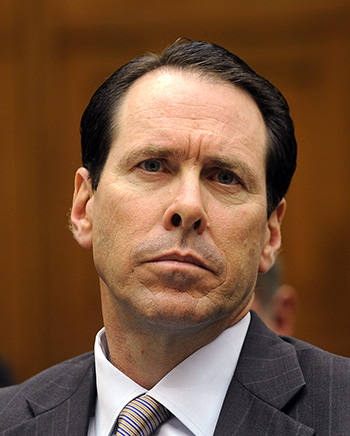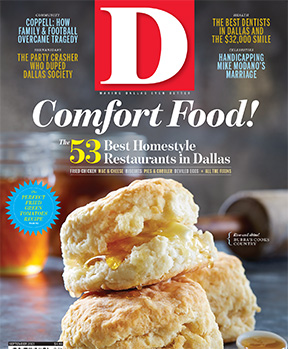Late last year, something quite extraordinary happened at Dallas City Hall. Civic leaders and businessmen held a news conference to announce plans to build a championship golf course in southern Dallas. The deal—involving city money, environmental remediation of an old landfill, and the formation of a nonprofit to run the facility—was orchestrated by Randall Stephenson, the CEO of AT&T. While the City Council would still have to give its approval, that was a just a formality. The speed with which it all happened was stunning.
Stephenson is a golf bigwig, a member of Augusta National Golf Club and the PGA Tour Policy board. He wanted a world-class course. He didn’t wait to gather support beyond the players involved. He just made it happen. He knew SMU needed a new practice facility. He knew the mayor needed something he could call southern Dallas development. He knew he could use poor black kids who want to learn golf as charitable cover. He knew carping liberal columnists would rail against the fuzzy logic of the entire development. Win-win-win-win-win.
The ruthless efficiency with which Stephenson did his deal calls to mind a simpler time, back when the Dallas Citizens Council still set the agenda. In 1937, when R.L. Thornton convinced the top executives of the 100 largest businesses in Dallas to join his new “citizens council,” he had one goal in mind: getting things done. “What we need,” he said, “is the boss men organized so we can act quick.” Led by an executive committee mostly comprised of bankers, the Dallas Citizens Council ran the city for the rest of the century.
Today, DCC membership includes about 170 CEOs who pay $10,000 a year in dues so they can influence regional policy in education, transportation, and major bond issues. (Stephenson, it should be noted, is a member.) It’s an active organization, with ties to PACs and the Dallas Regional Chamber, trying to run the city the way Thornton envisioned, in an “efficient, business-like” manner.
They’re succeeding, right? That’s what the bearded, laconic gadfly Jim Schutze and the lovable lefties at the Dallas Observer tell you, that the Dallas Citizens Council is a cabal of string-pulling puppeteers who control the city.
The problem: it’s not true. Not anymore.
Two historical events in the 1970s undermined the DCC’s power. One, Dallas adopted single-member voting districts, making it nearly impossible to lead the City Council from outside City Hall. Two, an insurgency of middle-class Republicans began to rail and run against the “fat cat” Southern Democrats who controlled the DCC.
Today, the DCC finds itself running low on mojo for two additional reasons, and they’re related. First, for the past 15 years, the DCC has tried to work within the political system rather than circumvent it. That’s wonderful if you’re a twee, left-wing Blue Stater who worries about every voice being heard, but not so great if you want to bend a city to your will. Second, this change in tactics has brought the DCC reluctantly into the spotlight as it tries to offer support for its causes and favored sons through traditional press coverage. And these CEOs are terrible at playing the modern media game.
Quick example: in May, top DCC executives gathered to discuss a letter written by Don Williams, the former Trammell Crow CEO and past DCC chairman. In his missive, Williams had broken ranks with the city’s elite by publicly chastising DISD chief Mike Miles, a man whose reform efforts the DCC supported. Williams had emailed his scathing letter to every politico, journalist, and CEO who mattered. It was a spotlight-seeking, guerrilla media tactic, the sort that gives the DCC fits.
How confounded were they? At that meeting in May to discuss Williams’ letter, John Scovell—CEO of Woodbine Development Corporation, longtime civic leader—finally offered the following suggestion: “Can’t we just shoot him?”
Tempting as that notion might have been, the DCC took much less drastic action. It disseminated a letter, co-written by the Dallas Regional Chamber and signed by dozens of business leaders, in which they went “on record showing our support for the very difficult changes recommended by Superintendent Miles.” Way too little, way too late.

“We don’t do PR well,” Halstead said. “We never have. Most groups publicize what they do because they need to raise funds. [Because of membership dues] we don’t have to do that.”
That’s why, when the DCC is pushed into the spotlight, it often can’t find its footing. Ranger and her cohorts—who are wrong, for what it’s worth—have painted Miles as a racist (even though he’s black), an obstructionist (arguable), and a weak leader (ridiculous). Because of this, the DCC’s message—that Miles’ reforms need time to work, that five straight years of increased graduation rates means he should continue his current course, etc.—gets lost. The conversation is over before the DCC utters a word.
Halstead wanted to correct public-perception mistakes by pointing out to me just how effective the group has been. She noted the important work the DCC has done over the past decade in support of education, with DCC leaders pushing for changes in laws and emphasizing the importance of research, which resulted in donations that have increased UTD’s research dollars from $12 million to nearly $100 million, earning it national Tier-One status.
Why not publicize this achievement (as well as the group’s “trench warfare” spearheading of Highway 121 expansion, which Halstead said has resulted in $3.3 billion in investment)? Because of the group’s reputation, for one reason. “People who think we want to run Dallas, that we want day-to-day control over all aspects of the city, are wrong,” she said. “Those days are long gone, and no one in the Dallas Citizens Council is advocating for that. Everyone knows those days are long gone. We want to work within the system.”
What kind of way is that to talk for someone who runs a cabal? It’s hard to imagine R.L. Thornton saying such a thing. Or, for that matter, Randall Stephenson.






